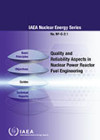Nuclear Fuel Assurance (NFA) refers to one of a number of mechanisms to establish an international framework for assurance of supply of nuclear fuel. It is led by the United Kingdom, and as with the other assurance mechanisms, it is designed to provide the States with an additional level of assurance for the front end of the fuel cycle.
Nuclear fuel assurance
The NFA originates back to the late 2000s. Following the International Atomic Energy Agency (IAEA) Director General’s initiative in 2006 on multilateral approaches on assurance of supply, on August 27, 2009 the IAEA received from the Resident Representative of the United Kingdom a paper on “Progress on the UK-led proposal for a Nuclear Fuel Assurance (NFA) based on non-interruption of commercial contracts for enrichment services.”
The UK put forward the concept of an NFA, based on the principle of Governmental non-interference in existing contracts involving suppliers of fuel services. This is a way to provide assurance of a continuation of such services where they might otherwise be interrupted.
On March 10, 2011 the IAEA Board of Governors approved a British proposal seeking to ensure the continued supply of nuclear fuel for energy to a country should its supply be disrupted for political reasons.
From the other initiatives to establish reserves of low enriched uranium (the IAEA LEU Bank and a facility in the Russian Federation) and the German proposal to establish independent access to enrichment services (the Multilateral Enrichment Sanctuary Project), the British proposal differs in that there is no stockpile of fuel involved, but a contractual agreement between a supplier country and a recipient state guaranteeing an uninterrupted supply. Thus no additional cost would be involved for either supplier or recipient state.
General features
At the heart of this UK-led proposal will be an NFA based on a model agreement between supplying and receiving States and the IAEA. It is intended that to provide assurance of non-interruptible LEU supplies the NFA would be of two types:
- A Standard Nuclear Fuel Assurance for a supply contract between a recipient and supplier as underpinned by an agreement between recipient state and supplier state where the IAEA would be a co-signatory.
- A Stand-by Nuclear Fuel Assurance that would ensure that a supplier would be able to provide fuel supplies in the event that a contracted third-party supplier in another state, with whom the recipient has a contract, is prevented from fulfilling that contract for non-commercial reasons. This would be a ’stand-by’ assurance, based on a similar agreement where the IAEA would be a co-signatory.
The IAEA, as one of the signatories to an NFA, would play a central role in providing the confidence-building of an NFA.
Standard nuclear fuel assurance
To apply a standard nuclear fuel assurance, the recipient would be about to sign, or be in the process of considering, a contract for supply of enrichment services/other fuel services with a particular supplier. In doing so, it would be able to draw on a model agreement to provide an assurance of continuity of supply with a supplier state. The agreement would be signed by both states and the IAEA, to the effect that the commercial contract would not be interrupted for non-commercial reasons as long as the commitments made by all parties as set out in the agreement continue to be met. There is also the possibility that an NFA may be agreed for an existing contract.
Stand-by nuclear fuel assurance
To apply stand-by nuclear fuel assurance, the ‘stand-by’ supplier would sign a commercial contract with the recipient who would enable such supplier to take over the supply responsibilities for fuel/enrichment services in the event that supplies from the original provider are interrupted for non-commercial reasons.
The stand-by supplier state would, in the same manner as for the standard NFA, sign a Stand-by Nuclear Fuel Assurance Agreement with the recipient state and the IAEA. The stand-by supplier would be able to rely on the terms of the agreement to provide the recipient with fuel services as provided under the existing contract in the event that the NFA is invoked.
Whereas a standard NFA would simply ensure continuation of supply, acting on a stand-by NFA would, in contrast, require positive actions to be taken by both recipient and stand-by supplier.






